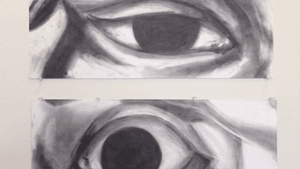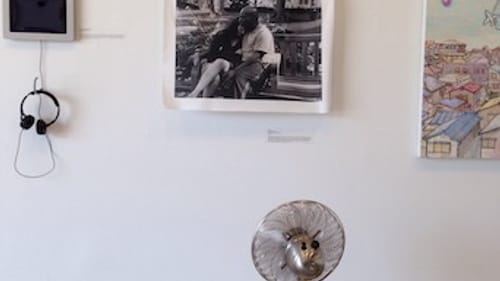Stay in the Loop
BSR publishes on a weekly schedule, with an email newsletter every Wednesday and Thursday morning. There’s no paywall, and subscribing is always free.
Interracial love 50 years after Loving
Asian Arts Initiative presents 'A More Perfect Union'

Donna Harris, a black woman, has been married to Craig Harris, a white man, since 1988. Their two daughters are now in their 20s. Podcast clips featuring the couple talking about their life together are part of A More Perfect Union, now on display at Asian Arts Initiative, commemorating the 50th anniversary of the Supreme Court decision legalizing interracial marriage in all 50 U.S. states.
Donna remembers when a stranger approached her when she was at a playground with her young daughter. “She’s really lucky, because she can pass,” the man said about her light-skinned child. As she recalls, the silent anger she felt almost “strangled” her.
A generation after Loving v. Virginia, it seems natural that the theme of this exhibition, curated by Dave Kyu, is as much about navigating interracial identities as interracial relationships. In the Asian Arts audio, available on a wall-mounted iPad with a headset, Donna shares moments when she became aware of her own children encountering prejudice, as when a sleepover party her daughter was invited to moved unexpectedly to a local park, apparently because one of the hosting parents did not want her biracial daughter under his roof overnight. (The featured podcast episode is produced by Farrah Parkes and her husband, Brad Linder.)
Eleven million
In its official statement on the show, Asian Arts strikes an upbeat note on commemorating Loving v. Virginia: “This decision affirms that our fundamental civil rights cannot be denied by race, and that the American system, although often flawed, is capable of correcting injustice.”
It might be easy to feel optimistic about the legacy of Loving v. Virginia: A 2017 Pew Research Center study found that by 2015, 17 percent of all U.S. newlyweds had tied the knot with someone of a different race or ethnicity, a fivefold jump from 1967. And 10 percent of all married people had a spouse of a different race or ethnicity in 2015. Nationwide, that’s 11 million people.
Greater racial diversity, especially in certain metro areas, helps drive this change, as do increasingly positive social attitudes to interracial marriage.
"A little too much"
But as the Asian Arts show demonstrates, for every instance of increasing acceptance, there’s also anger. One of Loving v. Virginia's legacies is the continued inability of many to avoid viewing others in rigid racial categories.
Another wall-mounted iPad in the show features videos of two fiery spoken word pieces by Michelle Myers, a biracial Korean-American woman. A Little Too Much (2014) and Listen, Asshole (2009) respond to people who ask “couldja couldja be a little less of that,” criticizing the artist for “trying to be black” because of her verbal stylings, or thinking she looks a little too white or not Asian enough.
Yeah, I’m mixed, Myers says, and “I’m confused as to who would ask me such a stupid-ass question.”
Emily Chow Bluck, in a close-up graphite diptych showing fingers manipulating an eye to be rounder or more slanted, struggled with her childhood sense of how she ought to look, and still faces the mirror “wishing my features could be something a bit more monoracial and straightforward.”

In Bluck’s note on another graphite drawing, War Bride, inspired by “Vietnam veterans who found or took wives from overseas,” she demonstrates that perceptions of interracial identity vary. Some parents battle negative prejudice on behalf of their mixed-race children, but Bluck says the wartime setting of her drawing, in which a white soldier leads an Asian woman out of billowing battlefield smoke, “seems to clash with the commonplace narrative that all mixed people, particularly mixed Asian and white children, are inherently privileged and well off.”
Telling hands
Other pieces include Jino Lee’s large inkjet photo printed on fabric, which shifts gently in the breeze of a small electric fan. It’s a sensitive portrayal of a black man holding a white woman on a park bench, though the subjects’ carefully separate, self-contained hands and pensive, opposite-facing expressions paint a subtly complicated picture.
Priyanka Dasgupta and Chad Marshall’s “video sculpture,” 2003’s Four Hands, “conceived in celebration of the artists’ own interracial relationship,” is a 30-minute live-action closeup of two lovers’ entwined hands. It’s mounted on a medium-sized flat-screen TV facing upward out of a black rectangular box on the floor, so that the viewer looks down to watch. The close focus and constrained frame make a moving image that is as intimate as it is disembodied, tender and compressed, expressing both tension and contentment.
Progress?
Per its 2017 study, Pew notes that acceptance of interracial marriage is taking root, with the percentage of people who say a growing number of interracial marriages is “good for society” jumping 15 points over the last seven years. In 1990, a majority of nonblack adults said they’d be opposed to a family member marrying a black person. Today, that has shrunk to 14 percent. It’s progress.
But when the percentage of people declaring personal opposition to an interracial marriage in the family still comes within a few points of the percentage of people in interracial marriages, it’s easy to understand why some of A More Perfect Union's artists feel angry about mischaracterization, discrimination, and the inability of many to accept mixed-race people and families on their own terms.
Given the current political climate, it’s worth noting Pew found “sharp partisan divide” on the topic: About half of Democrats and liberal-leaning independents surveyed say the rising number of interracial marriages are good for society; only 28 percent of Republicans and Republican-leaning independents agree. It’s not enough.
Parents like Donna Harris may continue to feel strangled as they raise their children, and forums for stories like her family's are important.
What, When, Where
A More Perfect Union: Celebrating the 50th Anniversary of Loving v. Virginia. Through August 25, 2017, at the Asian Arts Initiative, 1219 Vine Street, Philadelphia. (215) 627-2792 or asianartsinitiative.org.
Sign up for our newsletter
All of the week's new articles, all in one place. Sign up for the free weekly BSR newsletters, and don't miss a conversation.
 Alaina Johns
Alaina Johns